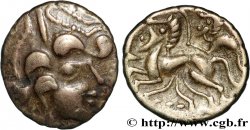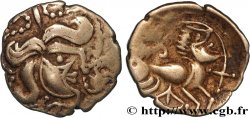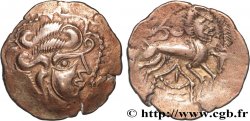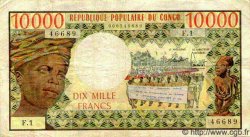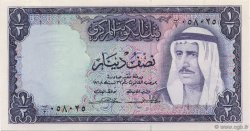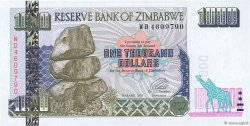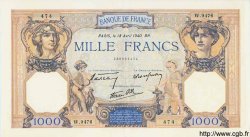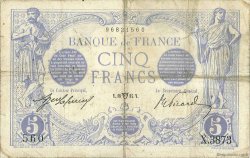bga_302834 - GALLIA - ARMORICA -OSISMII (Area of Carhaix - Finistère) Quart de statère au taureau et à l’aigle - cheval non androcéphale
недоступный.
Товар уже продан в нашем интернет-магазине (2013)
Цена: : 450.00 €
Товар уже продан в нашем интернет-магазине (2013)
Цена: : 450.00 €
Тип Quart de statère au taureau et à l’aigle - cheval non androcéphale
Дата: c. 80-50 AC.
Монетный двор / Город: Brest (29)
Металл: electrum
Диаметр: 12,5 mm
Ориентация осей монеты: 7 h.
Вес: 1,28 g.
Редкость: R3
Комментарии о состоянии
Flan un peu court, avec des types bien identifiables. Droit un peu décentré et revers sur un flan trop court. Patine sombre
Ссылки в каталоге: :
Лицевая сторона
Аверс: легенда: ANÉPIGRAPHE.
Аверс: описание: Tête à gauche, la chevelure en trois grosses mèches ; cordons perlés enroulés autour ; une croisette aux extrémités bouletées devant la bouche.
Обратная сторона
Реверс: легенда: ANÉPIGRAPHE.
Реверс: Описание: Cheval non androcéphale (?) bridé, galopant à gauche ; un aigle picorant à gauche, posé sur la croupe ; un taureau à droite entre les jambes du cheval.
Комментарий
Ce quart de statère, attribué avec certitude aux Osismes, est très rare. Le revers a la particularité de regrouper ensemble le cheval, le taureau et l'aigle ; il ne manque que le sanglier pour que le bestiaire gaulois traditionnel soit au complet.
Le statère unité de ce type existe avec deux types de revers ; l'un avec un cheval androcéphale et l'autre non androcéphale. Quant aux quarts, ils semblaient tous avoir un cheval androcéphale... jusqu'à la publication d’exemplaires avec un cheval non androcéphale.
Cet exemplaire présente un cheval qui n’est pas androcéphale, comme sur le D. S2226B !.
This quarter stater, definitely attributed to the Osismi, is very rare. The reverse has the particularity of grouping together the horse, the bull and the eagle; only the boar is missing for the traditional Gallic bestiary to be complete. The unit stater of this type exists with two types of reverse; one with an androcephalic horse and the other non-androcephalic. As for the quarters, they all seemed to have an androcephalic horse... until the publication of examples with a non-androcephalic horse. This example presents a horse that is not androcephalic, as on D. S2226B!
Le statère unité de ce type existe avec deux types de revers ; l'un avec un cheval androcéphale et l'autre non androcéphale. Quant aux quarts, ils semblaient tous avoir un cheval androcéphale... jusqu'à la publication d’exemplaires avec un cheval non androcéphale.
Cet exemplaire présente un cheval qui n’est pas androcéphale, comme sur le D. S2226B !.
This quarter stater, definitely attributed to the Osismi, is very rare. The reverse has the particularity of grouping together the horse, the bull and the eagle; only the boar is missing for the traditional Gallic bestiary to be complete. The unit stater of this type exists with two types of reverse; one with an androcephalic horse and the other non-androcephalic. As for the quarters, they all seemed to have an androcephalic horse... until the publication of examples with a non-androcephalic horse. This example presents a horse that is not androcephalic, as on D. S2226B!








 Cообщить об ошибке
Cообщить об ошибке Распечатать страницу
Распечатать страницу Отправить мой выбор
Отправить мой выбор Задать вопрос
Задать вопрос Consign / sell
Consign / sell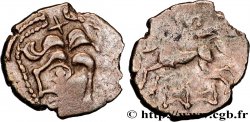
 Информация
Информация